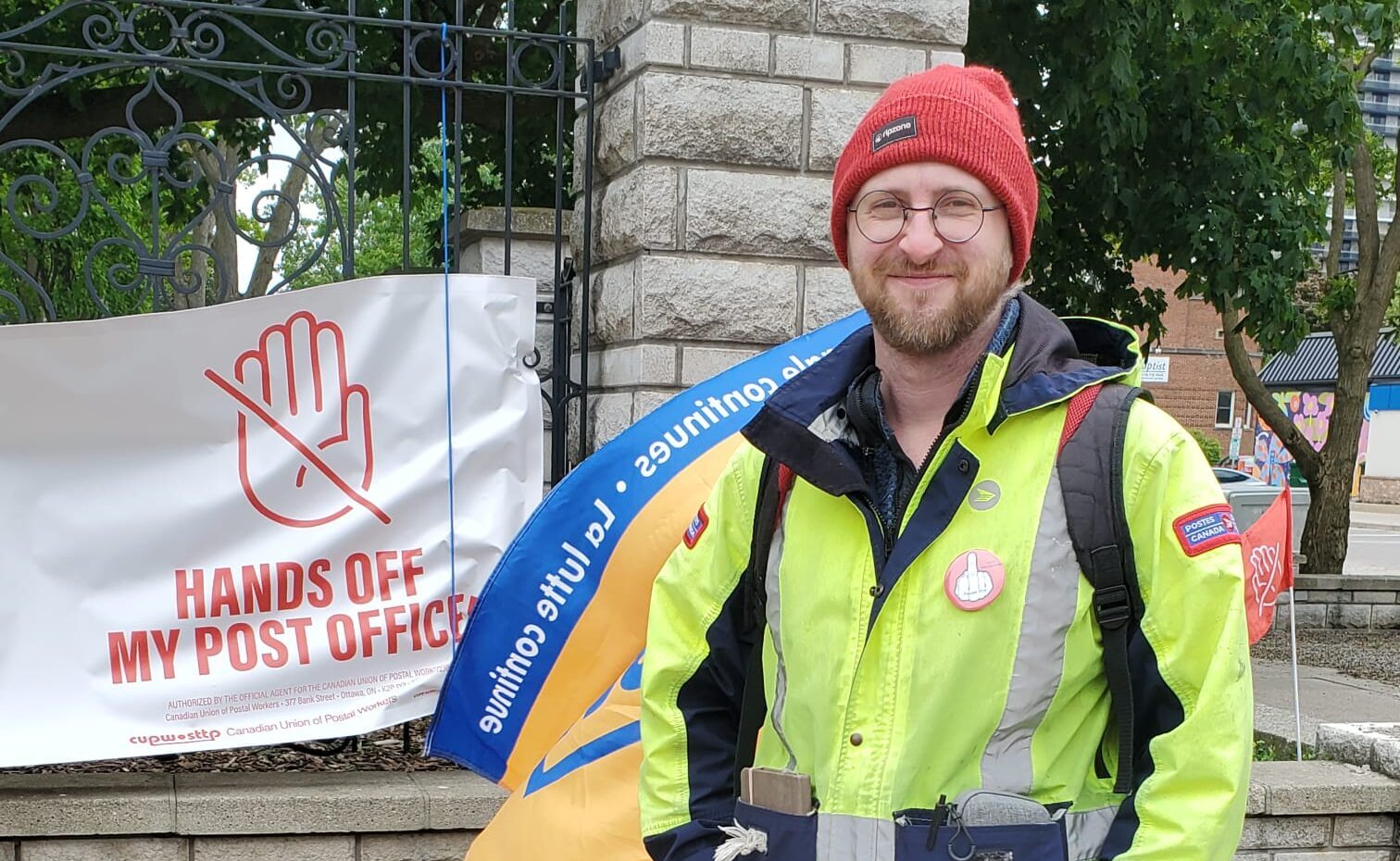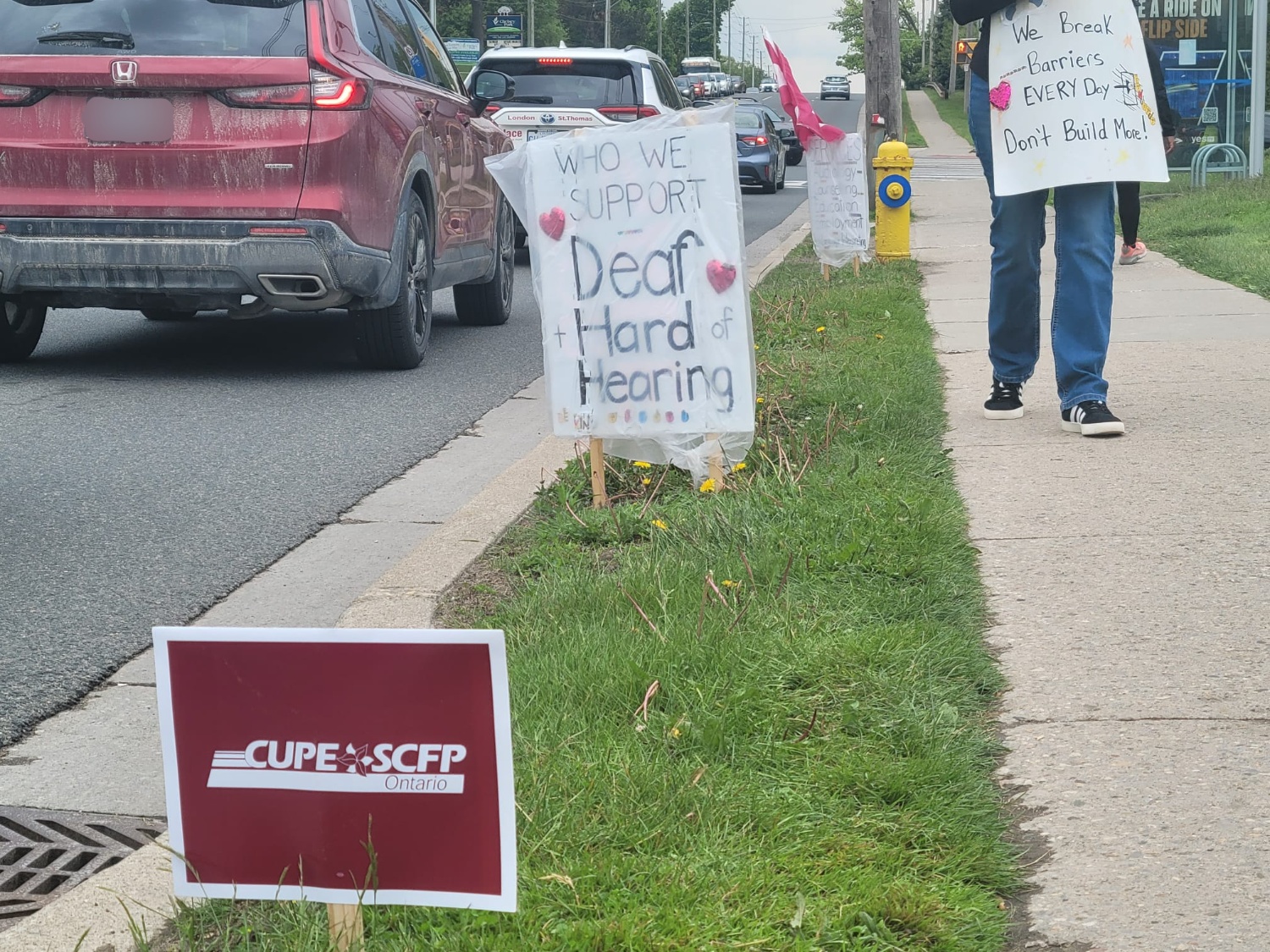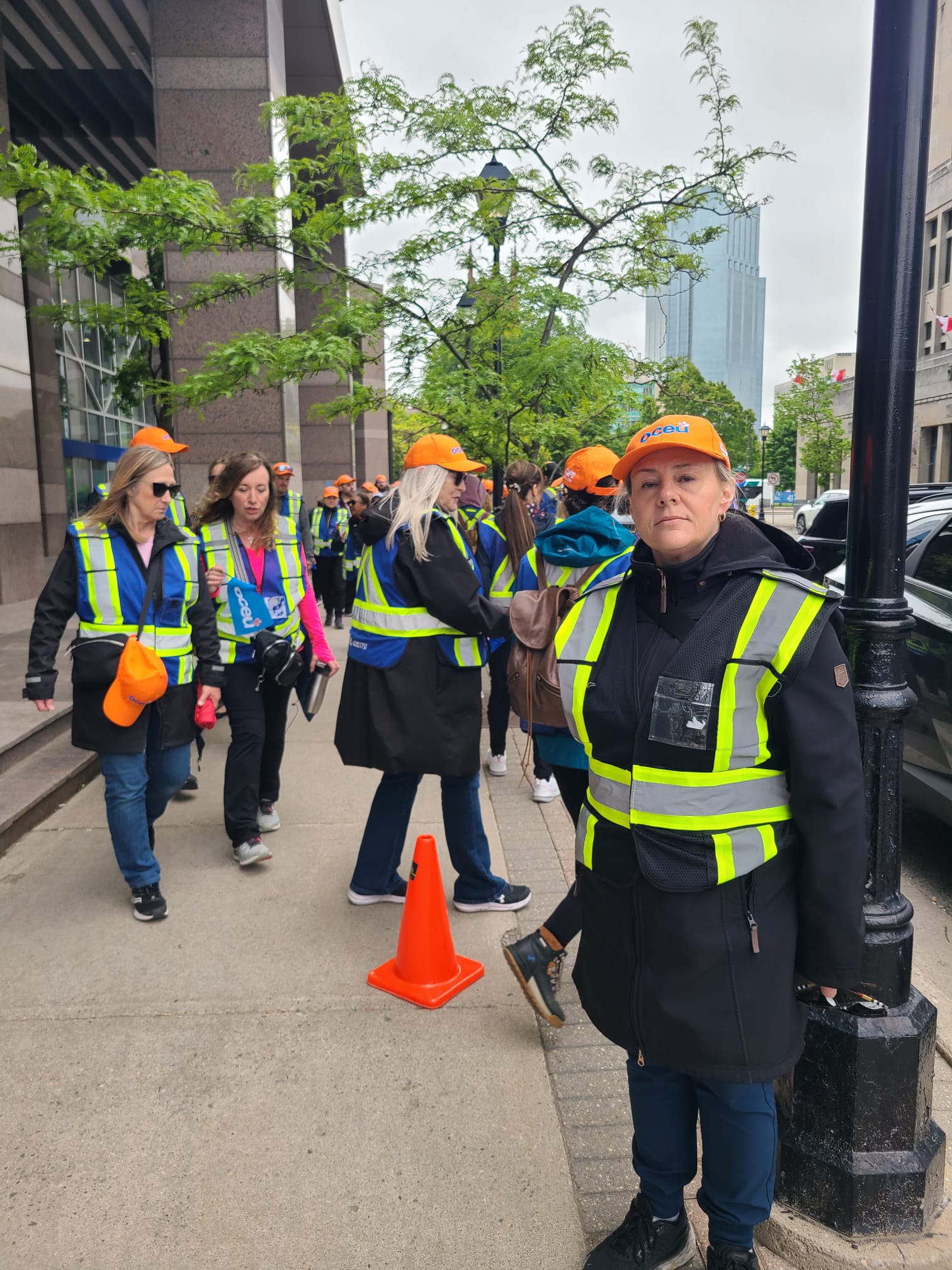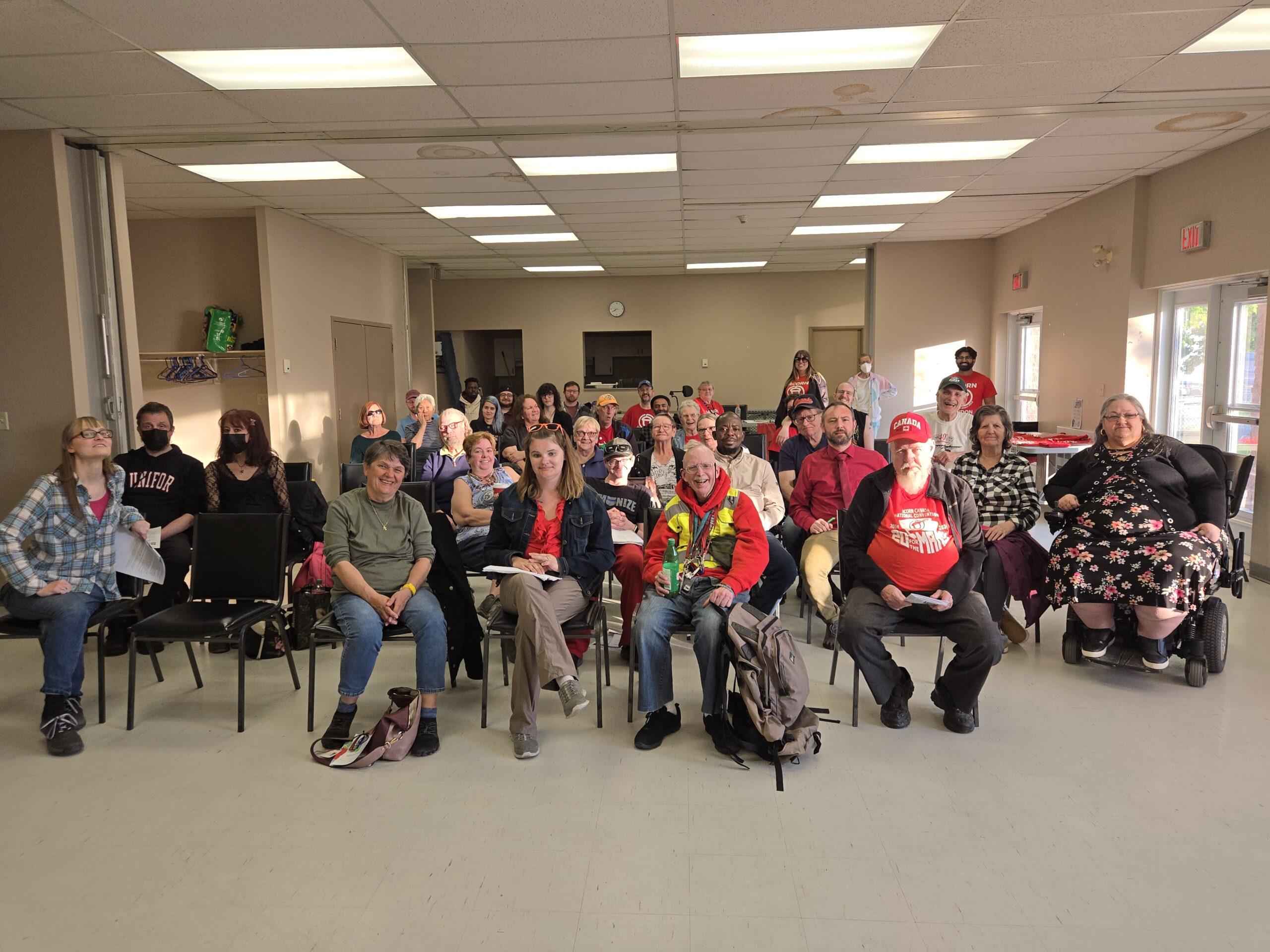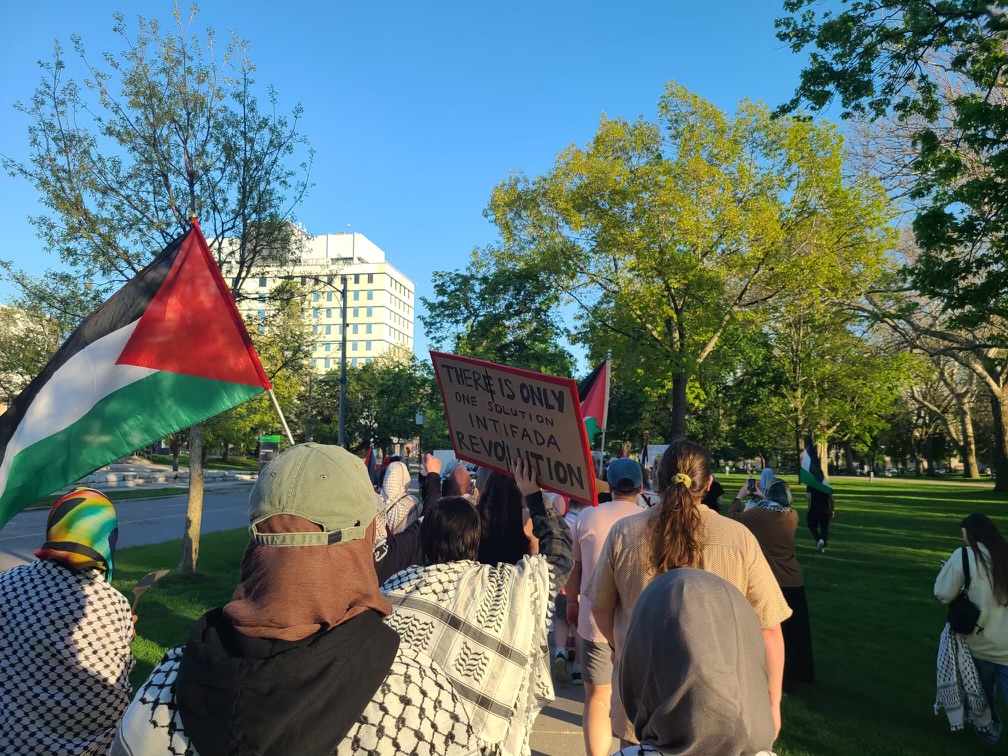Poetry and Prose, Roots and Rhythm: Black History SLAM
Emmanuel Akanbi
Thu March 13, 2025
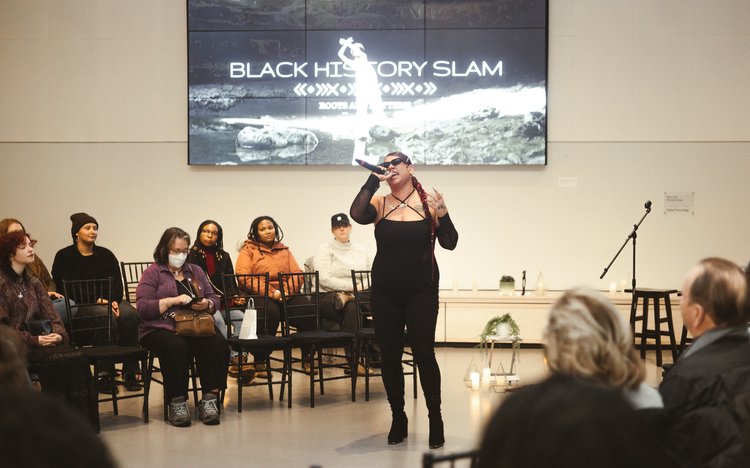
As the state of the world continues to change around me, it’s been hard to decide how to respond to it. There’s an endless list of things that need attention and many systems to fight to create any sort of change. When responding to a capitalist status quo that places profits above people and the environment at large, it’s hard to feel sane in any one form of response, so I’ve been able to find solace in multiple things at once. Protesting with the community; promoting and engaging in mutual aid; and, most recently through journalism, sharing underrepresented stories and perspectives.
In trying to write about the world I’m engaging in, I don’t frequently slow down to write for myself or promote my own perspective. Despite being affected by many of the causes I care to report on, I don’t often put my own voice in stories. As such, I’m not very familiar with poetry as an active medium. In a world that moves as fast as this one does, what value is there in just talking about myself?
To answer this question, on February 13th, I attended Spoken Culture’s second annual Black History SLAM. The event brought together a collective of five Black artists, four poets, and a local musician for a series of performances at Museum London under the theme “Roots and Rhythm: Celebrating Black Legacy in London”.
The event opened with a land acknowledgment by Misha Bower, a writer and musician based in London and a member of the Antler River Poetry Committee, one of the main event partners. Misha opened her land acknowledgment, a virtual picture of the Two Row Wampum Treaty belt behind her. She described what the belt means, using a quote from a Haudenosaunee chief.
“This belt symbolizes the lives of two sovereign peoples placing their vessels side by side in the water. Each vessel embodying their respective ways of knowing and being and traveling together in parallel, in perpetuity, peace, and in friendship, neither one infringing on the jurisdiction of the other.”
Bower acknowledged that this agreement has been routinely dishonored, and encouraged the audience to reflect on the original intention of the belt in alignment with the theme of roots and rhythm.
The first performance of the evening was a serenade by Tiffany Chantelle. She immediately pulled me in with her powerful velvety voice as she sang Lauryn Hill’s “Can’t Take My Eyes Off of You.” Her rendition charmed and immersed the crowd into what would be a night full of personal and intimate expression.
Shay — A Sound is still, a sound
I was invited to the Black History SLAM by my friend Shay, a talented Black poet who delivered the first spoken-word performance of the night. I’ve read a lot of Shay’s poetry, which immerses readers into his experiences of life, love, Blackness, trans identity and self-acceptance. Hearing his performance live was a different immersion altogether.
Shay performed an original poem that touched on his relationship with his estranged father and their connections through music, entitled “A sound is still, a sound.”
“You listen to music just like He did.”
Those words took root in my ear canal, but those roots bore thorns that whittle down
the impact of whispers drifting too close for me to avoid.
In time I grew curious
Was I always this noticeable?
Or did February become a microscope of which the reincarnation of faces can be observed on my blank stare.
When the teachers spoke of distant horrors, like a child placed down a bit of change they stole from their father’s wallet.
“It is a great shame we will never forget”
Until March emerges, de-thawing their frigid tones and guilt-frosted minds
As the Earth prepares for its rebirth. They eagerly await the soil to soften for the annual reburial — a sacred tradition for any colonial state.
Your peace, but I can’t promise I’ll hear you.
I’m too busy clogging my mind with stories
He was never around to drain out.
Malcolm X taught me that education was the passport to the future, so I stopped chasing apparitional fathers, for ghosts don’t tell stories — but they do permeate memories;
And He isn’t the only one who remembers.
They burn books of the past, to presently prevent our future
But voice exists without a body in music:
Where memory becomes communal;
So I put my headphones on and listened to those who listened before me:
Kendrick said, “If I’m generous at heart, I don’t need no recognition”
SZA warned me, I lose my sense of value if I stay in isolation
Bob Marley sent away the monsters who come in the night,
And like my tattoo says, I know every little thing is going to be alright
“Peace and blessings manifest with every lesson learned”
Badu’s words are food for my soul, as far as I’m concerned
Cole taught me there’s “No such thing as a life that’s better than yours.”
So, I wiped the dream from my eyes, and I felt my mind mature.
I know my mother meant no harm when she conjured phantom charms on her daughter; now a son at will, whose ears still listen to music like He did.
Only now, the tune has changed and my thorns have withered.
Words once gardened by my mother’s tongue grow wild and virulent in my mind
Creating syntax for a wasteland.
But not even bitter words can stop hope from ripening.
Like fruit from the strangest of trees that nourish my reasons for mourning
My lost thorns now replaced by fig leaves, they hoped would hide me from their “great shame”, but serve to fan the embers of anguish, immortalized onto sun-christened skin that scorches apathetic eyelids
And a sound is still a sound if no one is there to hear it.
It’s extraordinary, isn’t it?
That music moves my limbs exemplifying near-perfect mimesis of a man I’ve never known
Because memory exists in the body, not in the mind.
Perhaps it explains why I may instinctively reach for the sink to wash away bloodstained truths like their phantoms did before them.
Shay’s poem captures a strong variety of themes and emotions. From its critical line, a quote from his mother — “You listen to music just like He did.” — I felt how sharp those words must be, connecting me to a person I can’t meet, exemplifying a cultural connection that wasn’t there throughout his life, and how the ghost of that is still hidden in parts of Shay.
He connects his dissonance with how he feels about February as Black History Month. A time where the tragedies of the past are spoken of solemnly, and with the intention to appease and fade away by March. The system continues to push on, feigning to care in order to appease the guilt from the harms it has caused.
Shay insists he won’t forget. Even if the colonial education systems he lives under don’t preserve Black History, he can find communal memory in music. He holds the words that other Black artists — like Kendrick Lamar, SZA, and Bob Marley — have shared of their own struggles and those that have come before them.
These words encourage Shay, and thus despite finding metaphorical thorns in being compared to his father, he also finds some awe in how music can connect them, and the culture of Blackness that exists around him.
I am always delighted to hear my friends share their work and this is very clearly no exception. Relating to Shay through his own words on how he has adapted to perceive himself, how important music has been to connect to Black history, to connect to his father (regardless of whether he wants to or not), feels so personal in ways an intimate conversation with friends can’t be.
I think an interesting thing about poetry is that it really can’t be written for someone else. Whether or not the audience is intended to be someone other than the poet themselves, the poem is written and performed with the cadence the writer chooses, it comes from what they want to express and their choice of how they want to express it.
Sunday — Chicken Man
Part of the inspiration for me to document the Black history SLAM in an informal, non-journalistic writing style was how immersive the experience was for me, in ways expected… and not.
Immediately after Shay’s performance, Sunday Ajak took to the stage. Introduced by the host of the Slam, and fellow poet Mittypoems, Sunday began his performance by posing a question to the audience:
“Is anyone here a good listener?”
Thinking it to be a survey question (and that we are all explicitly here to listen to poetry), I slowly put my hand up and looked around the room expecting others to have done the same. Before I could begin to see other hands rise, Sunday looked directly at me, smirked, and said:
“You think so? Come here.”
Dealing with the surprise and embarrassment of misinterpreting this audience participation portion (or rather, falling victim to sly misdirection) and being singled out for daring to consider myself a good listener, I slowly walked toward the stage and sat on a chair Sunday had pulled up for me.
Upon sitting down, he turned to me and asked:
“Can I tell you a story?”
And so it began. Sunday embarked on his spoken-word performance, telling me — specifically me on a chair next to him in front of this audience of about 50 people — about a strange occurrence at his workplace.
“So I work at this hospital, right? It’s a pretty decent job. I do mostly admin work. Pretty routine stuff on a daily basis. I like routine. Structure, keeps me organized, and I just hate disorganization. You know I think that’s why I noticed him at first…. He always stuck to the same routine. It was like clockwork. I mean everyday around 1pm he would walk by the steps of the hospital. Every. Single. Day. No matter if it was snowing, raining — I mean, one time I even saw him out in a hailstorm. And at first… at first I just thought that he was someone who liked routine, just as much as I did. And normally, I wouldn’t pay too much attention to people like this, but this… guy just. Just really caught my attention. And every day he would walk by the steps, he would be pushing this stroller, right? With a picture of two little girls and a woman. And he would just be pushing it along and as he was walking he would be making the sounds of a chicken. It’s kind of crazy right?”
He posed the question to me for less than a second to which I rushed a nod, and he replied “Yeah no, that’s what I said too. We’re all so quick to judge, you know? I just think it’s human nature. What I didn’t know at the time was… just how… just how important he would become to me.”
As I’m held captive at the front of the stage, Sunday realized he should engage the rest of the audience.
“I think that’s enough right now. I should probably talk to them, right? Yeah, like them.”
For a moment, the story was suspended, as Sunday greeted the crowd and explained what his name meant to him.
“Hi. I like to think that my mom named me Sunday because she just knew I had to have a unique name. You know? One that people couldn’t forget. That’s the story I tell myself, at least. And you know I find that stories are powerful. They can create us, they can shape us. They can spark our imagination, fill us with wonder, make us think of things we never could ourselves. A story can save lives, it can move a mountain if you willed it to. Stories can capture you, keep you so enthralled that you become a part of it. Or rather — the story becomes a part of you. So I find it pleasant, that as I look across these beautiful faces, I see a composition of unique stories. Moments, memories, loves, traumas. The things that make you, you. In a way we’re all authors. Authors without pens or papers. Because the stories that we write, we get to live. But some of us… or most of us — we live the story of another. Maybe your own story is too painful. Maybe you’d rather pretend the story that you live could be one like someone you admire. Maybe some of you weren’t given a choice. Maybe the story that you live was… forced onto you. A narrative that wasn’t written by you, but tells you what to do, what to think, and especially what to be. Words as chains, language as fences, and labels as wardens.”
“So I look across the room again and I wonder — whose story are you living? And what I’d like to know is how the story of ‘less than’ has become a part of each and every one of us. A story that does not create, it does not shape, but terminates, subjugates, keeps you exactly where the original writers want you to be. So I guess this… is a well written story, wouldn’t you say?”
Leaving the rest of the audience to ponder the question, Sunday turned back to me, his scene partner, to continue our “one-on-one” conversation.
“So I got too curious. I just – I just had to know what the deal with this guy was, you know? So I asked all my coworkers, and I said, does anyone know — Who is this guy? What is he doing? Why is he there? Where is he going? And of course no one knew, but that didn’t stop me. I went online and I found his story was published in our local newspaper. And it turns out, this man — who they called Chicken Man — has the saddest story I have ever heard. So one night, Chicken Man, he woke up. And Chicken Man was a heavy smoker, right? And much to the dismay of his wife, he would smoke a lot in the house. And Chicken Man woke up to smoke filling his living room. It was in the hallways, the bathroom, it was — his house was on fire. And Chicken Man, like any normal person, he got up and he left. Left the house left quickly and as he’s outside he calls 911 and he says ‘hey come, here my house is on fire.’ A couple minutes after that he starts to hear the cries of his wife and kids upstairs. In his rush to leave he didn’t think to warn them who slept just above him. So the fire department comes and they find Chicken Man desperately trying to get in — the front door, the back door, the window. He just couldn’t do it. And he slinks down on the front lawn.
The wife’s brother comes. Finds out that his sister had died in the fire. Then finds out that it was — it was caused by a cigarette — and he knows Chicken Man’s past. So he grabs Chicken Man, throws him onto the ground, starts beating him, ‘You coward! Why didn’t you save my sister. You’re a chicken! You’re a chicken! You’re a chicken! You’re a chicken! You’re a chicken! You’re a chicken!’ over, and over, and over again. He was hospitalized that night. A few days go by, the doctors check on Chicken Man, they find out that he had lost his ability to communicate… so they let him go, with a clean bill of health, physically. And he never left. He walked the streets of that hospital, my hospital. Making the sounds of a chicken, with a picture of two little girls and a woman.”
This time, with no transition, he blended away from the story of Chicken Man to give his take on stories at large.
“You see the thing about stories, is they never really end now do they? No matter how final the original ending may be, there always seems to be a way that the story just keeps on going. And I think that’s what I love most about stories. And that’s probably what makes February so special. This entire month is about stories. This entire month is about stories. So to me February has become the way that we continue writing our stories.
So my question to you — who is writing your story?
I wonder, as I look across the room, I wonder when our children’s children’s children’s children celebrate this month and what it means to them, I hope, that it’s one of the amazing stories that I see in front of me today.”
Back to me —
“So I thought I could help. Right? I… his story has just become a part of me.
So I invited him over. I got him all the things I thought he would want, you know? A new stroller, some clothes, some food. I even got him a pack of cigarettes.
So that night. That night, it was my turn to wake up to the smoke. It was in my hallways, my bathrooms, my living room — my house was on fire.
And you know, I have a wife and kids. They were just upstairs. And I-I just, couldn’t leave them. I didn’t want to do that. So I tried to get up, I really did, you gotta believe me, I really did. I just couldn’t do it. And so I left the house knowing what I was doing. And as I get outside, I call 911 and I say, ‘get over here, my house is on fire, come save my family!’ and they arrive. But as they’re there, I make a decision, that if I saw him come out of that house… I was going to do something I was going to regret.
You see it was my turn to be filled with that anger — I felt what his brother felt, I felt what Chicken Man felt and it wasn’t good. And you know what happens next? Out comes Chicken Man. And he’s holding my wife and kids — I had never seen anything like it — and he puts them down in front of me, and he says ‘I’m sorry.’
And you know, the best part about that wasn’t how dramatic it was. What really stuck out for me was that he was able to rewrite his story. The one that had dominated his life. Filled with pain, it told him what to do. The words were his chains, the label Chicken Man was him. But he was able to rewrite it, and he proved to me that day — that the story never dies. That was four years ago. Chicken Man is doing well now. He’s the receptionist I say hi to everyday.
And so to everyone here: your story will never die — pick up the pen, and keep on writing. Thank you.”
To say this was immersive is a vast understatement, and to say that it was a masterclass of storytelling feels like underselling just how seamlessly Sunday’s performance blended the act of storytelling with the perspectives, reflections, and philosophies of a storyteller on the act itself.
I found myself so immersed in the story of Chicken Man that the return to the crowd felt jarring, as though I was the only person meant to be in attendance. The power in his voice and his words as he kept my attention and the attention of all around us was so striking.
Outside of the Chicken Man story, his points on storytelling felt subtle and conversational while still using the striking nature of metaphors and other such prose. As he began to describe those who might be forced to live the story another has told of them, his performance’s connection to the theme of Roots and Rhythm felt so clear and poignant. Controlling narratives with words, language and labels restricts what we can do, what power we have, what lives we get to live.
The Chicken Man story served as an excellent metaphor (‘metaphor’, as, to my knowledge, and the logic of chronology, Sunday does not have a wife and kids) for just how restrictive a story can be. The pain was so easy to image, the words were his chains, the label became all he was, and he was able to break out of that. Sunday’s happy ending for Chicken Man let the audience understand that a story doesn’t end, even if the label of Chicken Man is all we’ve known him as throughout the performance, we know he’s broken out of that story, and continued to tell his own.
This performance put the act of storytelling into perspective, and as with the previous one, allowed me to find something beautiful in the way stories can be told and shared.
Following Sunday’s performance, Tiffany Chantelle returned to the stage to give another captivating performance. This time, an original song entitled “Real Scars.” The song captured the moment, with a performance that felt so true to self and indicative of reflection. The beauty in performing your own work is surely not lost on me.
Eddie Lartey — Language
Following the serenade, Hamiltonian poet Eddie Lartey took the stage to deliver four short poems. His opening poem focuses on his journey and connection to his Ghanaian tribal language of Ga. In his poem, he swiftly describes and reflects on how important it is for him to revitalize and preserve the language, lest it become foreign to him and fade away altogether. He discusses the beauty of the language, the intricacies of pronunciations and tones that are kept, and how the slightest changes in tone could create entire worlds of different meanings. A standout line from this being:
If Ga people had a museum, it would be a poem
He preluded his next poem with why he thinks the Ghanaian accent is the sexiest accent there is and then saying “…but if a Ghanaian is really romantic, he’s going to write something like this,” before taking the audience on a trip of flowery language and confessions of love and romance. With lines like:
Kiss me with the promise of tomorrow on your lips
…
I want to break generational curses with you
…
Your breath is a love song i want to memorize the words to
…
There’s a rumor going around that you’re actually the cause of most natural disasters — beautiful enough to make the ground shake, to make the wind get dizzy.
As a Nigerian man and thus fellow West-African, this romantic prose is quite familiar to me — indicative of a bad omen to all who might hear it. But I digress, such flowery language is still sweet to the ears and made me quite bashful.
He followed up his love song with a poem about what a Ghanaian man would write if his heart was broken. Its opening line drew a laugh from the audience.
My cover letter to NASA:
I know what it’s like to wake up to the view of the most beautiful star and still feel light years away. There’s no need to administer zero gravity training. I know what it’s like to be halfway between flying and falling, to be floating while drowning in limbo. There’s no need to waste money on oxygen tanks, I already have so much experience being around someone so breathtaking I can sustain myself on what-if scenarios and old text messages, moon walk through memory most mornings, my bed has its own gravitational pull. Loneliness already knows my name, NASA, I beg of you. I’m dying to look at the world and find even the smallest sources of light. I already know how dark things can be. Everything after the breakup is alien. I’ve experienced traversing the extraterrestrial. NASA, I beg of you, place me on a spaceship. I told her I loved her to the moon and back, I just want to show her I wasn’t lying. NASA, I’m dying to ask the stars why they didn’t align for us.
His final poem recalled the experience of struggling to communicate across barriers, reflecting on speaking sign language with his deaf childhood friend Yusuf when he was four.
We communicated via the pressing of hands and the focusing on each other’s presence. A smile exists in every language. Every conversation was a secret handshake. Our Joy was the loudest, kind of beautiful.
Eddie continued to say that when he was four, his mother introduced him to God.
She said Jesus was her best friend, and we communicated the same way me and Yusuf did, through the pressing of hands and focusing on each other’s presence. And ain’t that just like God — to speak in signs?
Eddie continues to reflect on moving away from London, from Yusuf, and wishing to connect. He shares how he couldn’t cry when his grandmother died, instead turning to prayer and growing his relationship in faith and what that connection meant to him.
On nights like this, I miss God the most and ain’t he the best type of friend? The type you can lay beside and not have to say anything and feel understood. And in that moment, I realized how close me and Yusuf actually were. How silence is our mother tongue.
He reflects on what it means that he has forgotten sign language, and how much of the connection he once held dear is lost. He concludes with:
But I realized — sometimes so much is said by saying nothing at all. And love has its own divine decibel audio waves, greeting the best parts of ourselves. When something is this loud, when something is this beautiful, you don’t necessarily hear it — you feel it, in your chest.
It wasn’t until I relistened to my recordings of the performances that I realized that all the poems had to do with language. Connecting to a traditional language, speaking about love in that language, speaking about loss in that language. There is so much care and thought put into each poem and how it can focus on a different part of the importance of language, whether communicating how much you love someone, how badly you miss someone, or how desperately you wish you could speak to someone again.
Although each poem was fairly short, collectively they told a very important message.
Eddie’s final message to the crowd before departing was, “All jokes aside, whatever language you speak — I pray you speak love.”
Mittypoems — To Rise
The next spoken-word performance was delivered by Mittypoems, and underscored with a spacial instrumental track. Without delay she embarked on her spoken-word journey and call to action.
To rise when not heard, to not utter a word, because the room is too loud, because I was born to be strong, taught to be strong, built to be strong because of the colour of my skin
The poem detailed the racialized experience she has had in trying to stand up for herself, the difficulty in doing so and the forces she is up against in trying.
To rise with a story they do not bother to ask for, a voice they say is too loud, too bold, too much.
She opens many of her lines with “to rise,” as though to command and demand action be taken, even with the surplus of challenges that are present.
To rise when they ask, “where are you really from?” As if my accent is a choice, as if my birthplace a mistake, as if my roots must be elsewhere to explain my existence, as if my heritage African, and Asante by roots is a badge of shame — to remind me again and again and again that I do not belong.
She expresses the importance of taking a stand, what it means to rise, how serious it is in the face of adversity.
Because to rise, is not a joke, it is a hassle. To rise to face your fears every day, to walk with your head held high, to believe in something beyond yourself, to rise to as to pray through your fears, to rise to rise to rise.
…
To rise is to fight, is to fight, not against your neighbor, but against the systems, against the demons, against the chains that hold us down, against the weight of history pressing on our backs, telling us that we are nothing but slaves.
Mittypoems’ closes her performance with an acknowledgement of African-American poet Maya Angelou.
To rise is to reach deep, deep down to the womb of who you are. Oh you child of courage, child of God. Maya Angelou is right — I am the dream and the hope of the slave, born to rise.
The power and passion in her delivery rings in my ears even writing this now. The whole performance captivated me and just spurred sudden motivation.
Following another serenade by Tiffany Chantelle — a gorgeous fusion of Jackson 5’s “I want you back” and the Fugees “Ready or Not” — the night of performances was over.
As the night ended, I was left to think about how much value it brought me. I don’t frequently seek out poetry but I felt so lucky to have been a part of this audience, hearing and being a part of such full, engaging and inspiring performances. There’s so much joy in seeing people speak through a medium they are passionate about. So many individual relationships to storytelling, to language, to music.
There is passion behind every word spoken. There is a person behind every performance delivering a message so clear and personal to them in a way that is so charming and delightful and engaging and inspiring.
I think the power of writing, in all capacities, is how much you can share with someone else, and I hope to begin a journey of finding my own voice to share something passionately with anyone who would enjoy hearing it.


